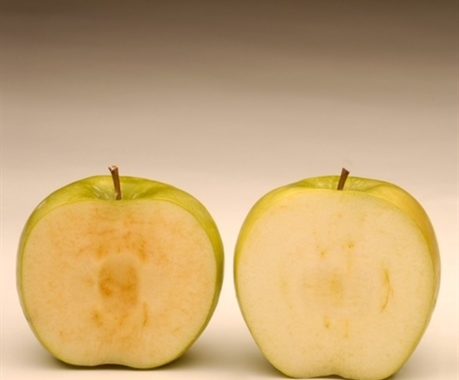As of November 2017, select stores in the US are selling an apple variety called Arctic® Golden. It’s the same as the Golden we’ve known and eaten for decades, only this one doesn’t go brown—at all, ever—after it’s bitten into, sliced or even bruised. (Browning from rot is a different process entirely.)
All because of one enzyme called polyphenol oxidase (PPO). In a normal apple that’s been cut or bitten into, PPO reacts with the oxygen in the air, leaving a brown stain. The same thing happens to avocados, bananas, pears, etc. Until now, we’ve been coating fruit in lemon juice to stop them browning. Lemons are full of ascorbic acid, which reacts with oxygen before the PPO can. But it’s only temporary. Once the ascorbic acid is used up, the PPO takes over and the fruit starts to go brown.
“So we turned off the PPO gene to stop the browning process altogether,” says Neal Carter, President, Okanagan Specialty Fruits. “Using RNA interference, which is a naturally occurring pathway often used in agricultural biotechnology, we introduced apple genes that produce less PPO into apple leaf tissue. Then we grew that tissue into plantlets, and grafted them onto rootstock to grow just like conventional apple trees.”
Sounds easy but, between perfecting the science and obtaining FDA, USDA, Canadian Food Inspection Agency and Health Canada approvals, 20 years whizzed by. In that time, however, the company has demonstrated that Arctic® trees behave just like any other apple tree under the same conditions, and that the fruit are just as nutritious as regular apples.
Watch a time-lapse video comparing the browning of Arctic® Golden to regular apples.
What everybody is waiting for now is… consumer reaction. Will they like them? Will they buy them? And perhaps, more to the point—as the first such apple to hit supermarket shelves—will Arctic® apples get mired in a similar controversy as, say, Golden Rice?
It’s a fair question. Golden rice was genetically designed to remedy Vitamin A deficiencies in parts of the world where rice is a prominent part of people’s diet. In spite of that lofty goal and winning a 2015 Patents for Humanity Award, it is viewed either as a panacea or a poison (no grey area here!), and distribution remains severely limited.
Arctic® apples, on the other hand, were designed with consumers in mind. Company research shows that taste testers rank these apples higher in texture, crispness and visual appeal; 92 percent of apple lovers would buy them; and 67 percent of consumers prefer preservative-free apple slices—which, of course, these are.
“Per capita apple consumption in the US has declined or remained stagnant for more than 20 years,” points out Carter. “Just as ‘baby’ carrots helped double US carrot consumption and are now the majority of US carrot sales, we believe that Arctic® apples can help more people eat more apples.”
Could it be that Arctic® apples have found the “sweet spot” between a good-looking, healthy, tasty snack that people crave and… junk food? Quite possibly.
At first blush, these apples appear to be winners all around. Carter got into genetics because, as an apple grower, he was appalled at the waste from bruising during harvesting and packing. That can now be greatly reduced. Not to mention the 19 percent of apples wasted at the supermarket from bruising, so profit to be gained there, too. And consumers are less likely to throw away perfect-looking apple slices, even if they have been in the fridge a while.
“Humans have been selecting for traits in food plants and animals to meet their needs for thousands of years,” says Neal. “Today, we do it more precisely using technology. The nutritional content of the Arctic® apple is the same as that of a regular apple. What does change is that, with a growing global population, we can derive more benefit from what we produce by wasting less. That’s a good thing.”
While the 2017 crop of Arctic® Goldens is a drop in the bucket, the production (and therefore, availability) will increase exponentially in coming years. As well, the Arctic® Fuji received USDA approval in fall 2016, so that will come into production soon; and additional tree fruit varieties are in the pipeline. That’s a good thing, too.
*Image courtesy of Okanagan Specialty Fruits Inc.

